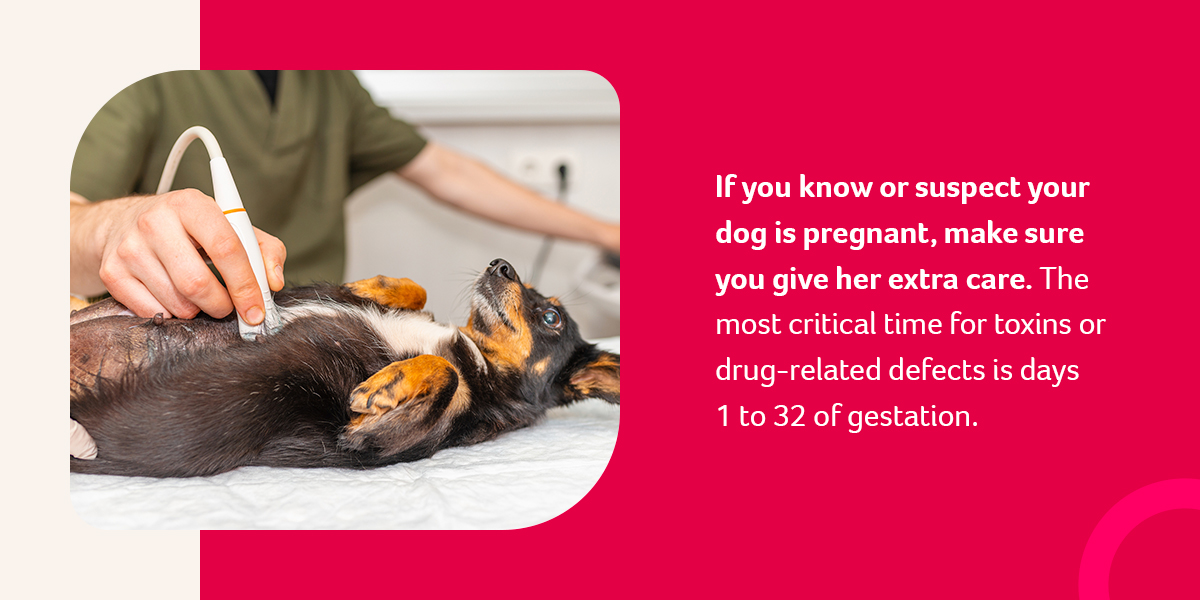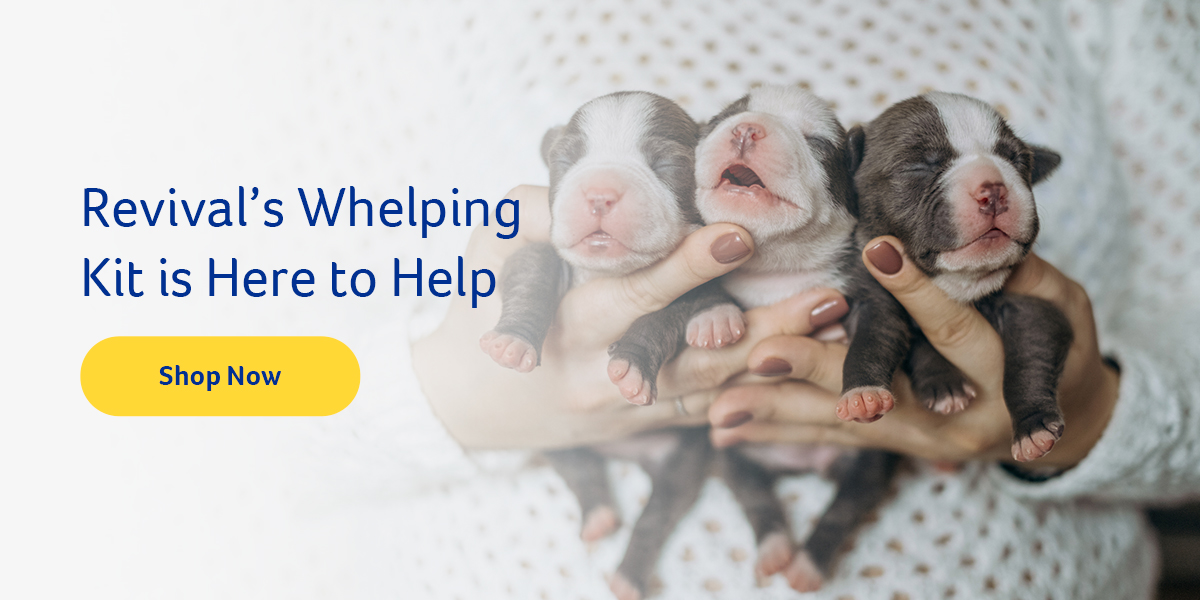Healthy puppies come from healthy moms. Understanding the dog gestation period is critical to ensuring her embryos develop properly and her puppies are born healthy and strong. Here’s a quick look at what happens during each stage of gestation as embryos develop into puppies.
How Long Does Dog Pregnancy Last?
The gestation period of a dog lasts 63 days, based on ovulation timing, plus or minus 48 hours. Ovulation timing with quantitative progesterones is the most accurate way to determine a due date. To estimate her due date without progesterone timing, you can count 62 to 65 days, counting from the last breeding. Once the female no longer accepts the male, you can expect puppies about 62 days later. Small litters with more room may have a gestation period that’s a day or two longer. Large litters may go a day or two earlier.
When Will I Know My Dog Is Pregnant?
Dog embryos are tiny and have to be viewed under a microscope until about 30 days gestation. You’ll see visible signs of pregnancy at around 35 days, but you can do an ultrasound as early as 28 days if you want to know an estimate of how many embryos are in the uterus. In general, blood testing is unreliable as an indicator of pregnancy.

Taking Care of Pregnant Dogs
If you know or suspect your dog is pregnant, make sure you give her extra care. The most critical time for toxins or drug-related defects is days 1 to 32 of gestation. Cleft pallet and bone defects happen during the end of this period (days 25 to 32). Nothing should be given to mom during that time that does not help the pregnancy. This is when puppies’ organs are being formed. You can cause damage by giving her the wrong drug or supplement at the wrong time.
Dog Pregnancy Calendar Week by Week
Dogs are pregnant for an average of nine weeks, so dog pregnancy changes day by day. Follow this calendar for an accurate idea of what to expect each week:
Weeks 1-4
The first month of your dog’s pregnancy is full of small changes, including the following:
- Week 1: Your dog becomes pregnant.
- Week 2: Your dog’s energy levels should be the same, but watch for weight gain.
- Week 3: Your dog may experience morning sickness for a few days, after which her appetite will return to normal.
- Week 4: Visit your vet to confirm pregnancy. The embryos are growing quickly, so supplement her diet accordingly. At this point, if she is confirmed pregnant, increase her food by 10% a week.
Days 21 to 32 are also the critical time to be giving prenatal vitamins such as Breeder’s Edge® Oxy Mate™ since organ, spine and brain development happens during this time. Prenatal vitamins were good for your mom when she carried you and they’re good for your dog mom as well for the same reasons. Vitamins during pregnancy are necessary so babies are born as healthy as possible. We want puppies born healthy and fighting to live. We don’t want to fight to keep them alive.
Providing prenatal vitamins in addition to a regular healthy diet gives mom all the help she needs to grow healthy embryos. From days 21 to 32 of the pregnancy, there is no need for extra calories and we don’t want mom fat! An overweight mom can lead to difficult birth and C-sections. Remember, if you have to look under a microscope to see them, how much can they possibly need?
Weeks 5-8
After week four, the embryos are referred to as fetuses, and the female enters another of the stages of pregnancy in dogs. Watch for the following changes:
- Week 5: Your dog might display more affectionate and clingy behavior.
- Week 6: Your dog’s belly will get bigger, and her teats will become a darker pink. She will need to rest more and eat more nutrients.
- Week 7: Deworm the dam with daily fenbendazole and have her checked out by a vet. Provide her with a whelping box as she looks for a safe space to deliver the litter.
- Week 8: The fetuses are fully developed, and your dog will start lactating.
At about day 45, it is necessary to increase calories since the rapid growth of the babies will cause an increase in appetite. At day 45, the cartilage bone formation starts to calcify and can be seen on an x-ray. When it comes to day 55, we often start giving mom puppy food since there are more calories per bite and she is running out of room in her tummy. It’s important to be sure mom stays on food until term and birthing start.
Week 9
Ensure your whelping supply box is complete and your dog has a safe space to deliver her puppies. About two days before labor begins, your dog loses her appetite and becomes restless, digging and panting.
The next step is whelping. It’s an exciting moment when those puppies start to arrive. We have lots of resources available on whelping, so make sure to do your research ahead of time so you can be prepared and have a successful and positive whelping experience. If you have questions, don’t hesitate to call a Revival Animal Care Specialist at 800-786-4751.
How Long Are Dogs In Labor?
Labor can last between 3 and 12 hours. Your dog may strain for up to two hours before giving birth to the first puppy, after which she should remove the membrane so the puppy can breathe. She may need help here, so be ready to jump in.
What to Do After Labor
Once the birthing is finished, clean your dog as much as she will allow with a washcloth and warm water — no disinfectants or soap. Clean her whelping box and refresh it so she has somewhere dry and comfortable to recover.
She may not want to leave the puppies to go to the bathroom, but try to ensure she does. When you take her out, check her nipples and vulva for any signs of bleeding or unpleasant-smelling discharge. Contact your vet if you’re concerned.
How to Care for the Puppies After Birth
Check on the puppies every few hours and ensure they don’t get too cold. Weigh, temp and check urine color on them regularly to check that they’re getting enough nutrition. They’re getting nutrients from mom, so ensure mom gets the best possible food. Have your vet check them over around 48 hours after birth.
Order a Whelping Kit From Revival Animal Health Today
If you’re breeding your first litter of puppies, Revival Animal Health has everything you need for pregnancy, birthing and puppy care. You can get all your supplies from a company that gives pet care from the heart. Shop using Revival’s Whelping Kit today to enjoy your first litter hassle-free.

Remember, your first litter is an exciting step, and with Revival Animal Health, you can bring puppies into the world. If you ever have any questions along the way, don’t hesitate to call a Revival Animal Care Specialist at 800–786–4751.
This is the third article in our My First Litter Series. Other articles in the series talk about whelping, newborn puppy care and what to know before raising a litter of puppies. Be sure to check out all the articles in the My First Litter Series.
LEARN MORE:
30+ Things Not to Give Pregnant Dogs
During a dog's pregnancy there are certain medications and substances that should be avoided. Learn what should not be given to a pregnant dog.
Dr. Greer’s Dog Breeding, Pregnancy and Whelping Plan
Plan your dog breeding, pregnancy and whelping with help from Dr. Greer's easy-to-follow dog breeding guide.
Deworming Pregnant Dogs: Dr. Greer’s Canine Deworming Protocol
Can you deworm a pregnant dog? What do breeders use to deworm puppies? Deworming pregnant dogs is essential to protect newborn pups. Learn which dewormers are safe for pregnancy, and the best dewormers for puppies and stud dogs.
8 Must Haves for Pregnant Dogs and Puppies
How do you take care of a puppy and mom after birth? Make sure you have these pregnant dog and newborn puppy supplies on hand, before the little ones arrive.
Written by: Marty Greer, DVM
Director of Veterinary Services
Marty Greer, Doctor of Veterinary Medicine, has 40+ years’ experience in veterinary medicine, with special interests in canine reproduction and pediatrics. She received her Doctor of Veterinary Medicine from Iowa State University in 1981. She’s served as Revival’s Director of Veterinary Services since 2019. In 2023, Dr. Greer was named the Westminster Kennel Club Veterinarian of the Year.
